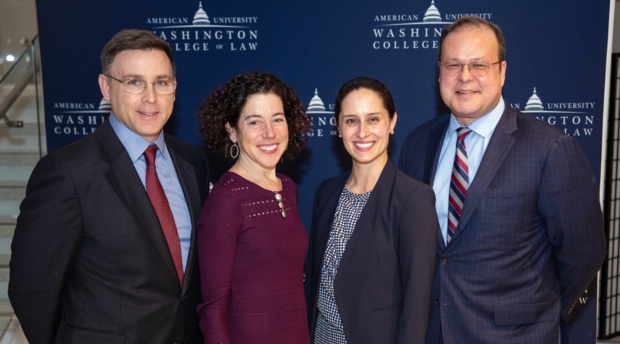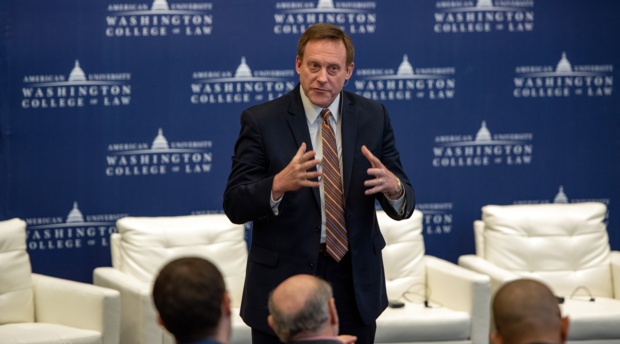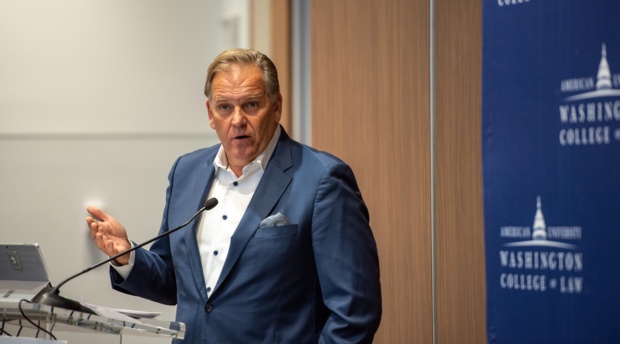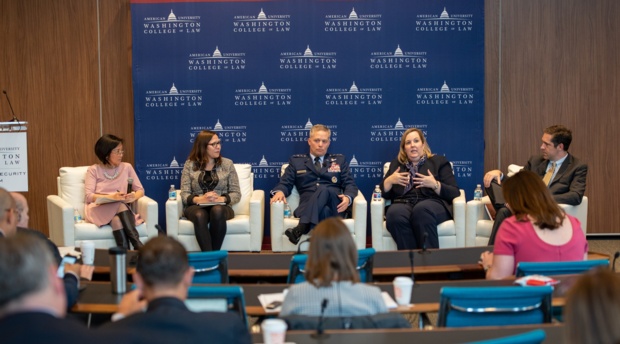AUWCL Launches Technology, Law, and Security Program
Feb. 19, 2020

On Thursday, February 13, 2020, American University Washington College of Law officially launched its new Tech, Law, and Security Program (TLS), an initiative that seeks to tackle challenges at the intersection of law, policy, and technology. The program operates as a mini think-tank within the law school, focusing on undertaking tough problems and developing policy-relevant and practical solutions designed to protect and promote individual rights, security, and the functioning of democratic institutions. In addition, the program will help educate and train AUWCL’s diverse body of students to become leading experts in these fields.
Vice Dean Susan Carle relayed Dean Camille Nelson’s welcome to the attendees of the launch: “Our new Tech, Law, and Security Program will put Washington College of Law at the forefront of some of the most critically important legal and policy issues of our times. The program, led by some of the most highly respected leaders in the field, will — together with our longstanding and high-impact focus on intellectual property — help shape technology law and policy for the future.”

“TLS is comprised of leading experts in each of the program’s key areas, ensuring that our research and other output is timely, calibrated, and positioned to directly influence policy and practice,” said Professor Jennifer Daskal, national security law expert and TLS director. “We will serve as an influential source of information for public and private sector leaders alike, while at the same time training the leaders of tomorrow.”
Daskal continued, introducing the rest of the program’s team, including Gary Corn, U.S. Army colonel (retired), widely recognized as one of the nation’s top experts on cyber and national security law; Scholar-in-Residence Alex Joel, senior officer with the Office of the Director of National Intelligence; and Assistant Director Ya’ara Barnoon, previously at Hughes, Hubbard & Reed’s Anti-Corruption and Internal Investigations Group.

The half day launch event, entitled “Guarding Our Democracy: Responding to Malicious Interference in a Digital Age,” featured a keynote address by Admiral Michael S. Rogers (retired), former head of U.S. Cyber Command, and a panel discussion moderated by Washington Post national security reporter Ellen Nakashima.
During his keynote, Admiral Rogers stated that “guarding democracy is more about culture and social dynamics that it is about technology,” which puts law schools and legal education at the center of potential solutions. “As a society, increasingly, we cannot come together on issues that will shape our nation – that is our greatest threat. The only way we will get out of it is to work together – everyone of us has to be part of the solution.”
The panel consisted of Shelby Pierson, Election Threats Executive, ODNI; Lt. Gen. Timothy Haugh, Commander, 16th Air Force; Bobby Chesney, Lawfare and UT Law; and Laura Rosenberger, Alliance for Securing Democracy, GMF; and focused on various international actors using information tactics online – more so the manipulation of information as Rosenberger explained, to undermine democracy. The participants discussed how the government, civil society, and the private sector should come together to regulate misinformation. A main question/theme that arose was that we may need to develop new initiatives so as not to compromise the military’s place, but to help give civilians some sort of guidelines in the expanding online information space.

A closing address on election security and foreign interference was delivered by former chair of the House Permanent Select Committee on Intelligence, Rep. Mike Rogers.
TLS will take on issues through projects that initially fall within four interconnected focus areas: content regulation in the digital age; privacy, access to data, and surveillance; cyber and information conflict; and artificial intelligence and emerging tech.
For more information on the Tech, Law and Security Program, visit wcl.american.edu/techlaw.